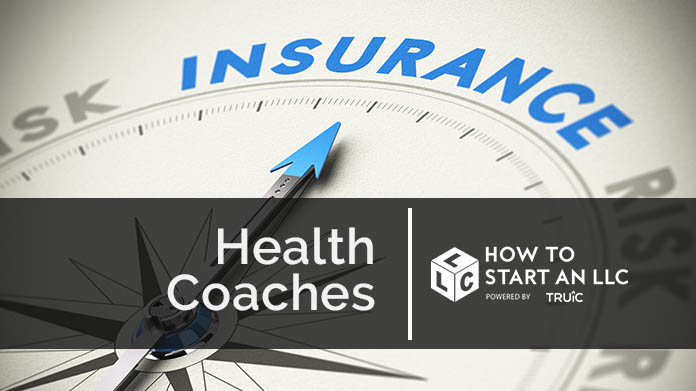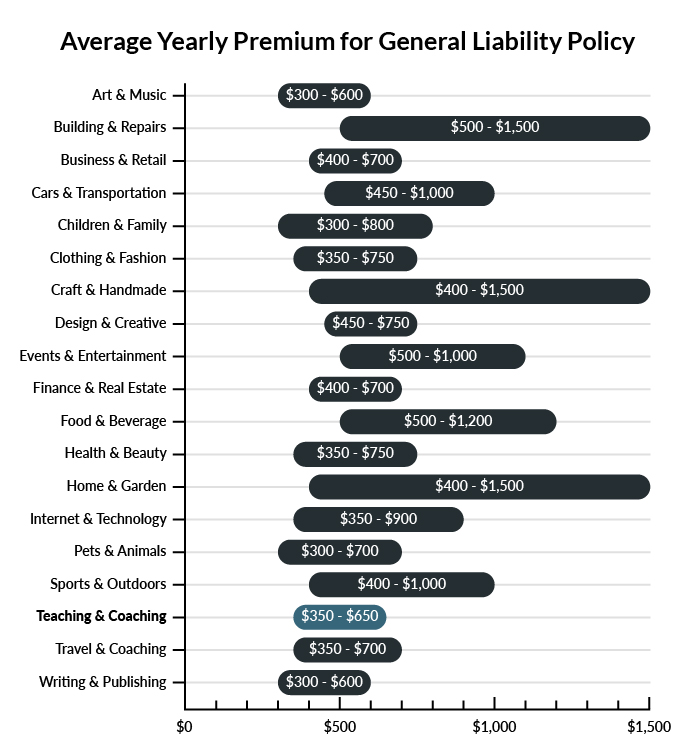Health Coaching Business Insurance
Getting insurance for your health coaching business is essential.
Health coaching businesses can face significant financial liabilities, including legal judgments for personal injuries and product liability.
For example, someone could sue you for providing allegedly negligent health advice that resulted in illness.
We’ll help you find the most personalized and affordable coverage for your unique business.

Recommended: Ergo Next Insurance is dedicated to matching small businesses with the right policy at the best price.
Best Insurance for a Health Coaching Business
General liability insurance is — generally speaking — one of the most important insurance policies for health coaching businesses.
Some of the risks general liability insurance covers are:
- Bodily injury
- Property damage
- Medical payments
- Legal defense and judgment
- Personal and advertising injury
Besides general liability insurance, your health coaching business could use several other types of specialized insurance policies, such as:
- Property insurance: Any equipment you use as a health coach, such as printers, scanners, copy machines, or computers, is covered for damage, loss or theft by this type of insurance.
- Business interruption insurance: If you need to cease operating your health coaching business for any covered reason, this will reimburse your lost income.
- Data breach insurance: If someone penetrates your company’s computer network and steals data, this will cover damages alleged by those affected.
The insurance providers that sell these policies can generally be categorized into two groups:
- Traditional brick-and-mortar insurers — Known for reliability and experience, these insurance companies include some of the largest in the US (e.g., Nationwide and The Hartford). They typically employ insurance agents who sell insurance from offices and thus charge on the high end.
- Online insurers — Companies in this group are becoming more popular because they’re more affordable and faster than traditional insurers. We recommend them for most small businesses.
Let’s Find the Coverage You Need
The best insurers design exactly the coverage you need at the most affordable price.
Cost of General Liability Insurance
On average, health coaches in America spend between $350 – $650 per year for $1 million in general liability coverage.
Compare the average cost of general liability insurance for a health coaching business to other professional industries using the graph below.
Several factors will determine the price of your policy. These include your:
- Location
- Deductible
- Number of employees
- Per-occurrence limit
- General aggregate limit
You may be able to acquire general liability insurance at a discounted rate by purchasing it as part of a business owner’s policy (BOP) rather than as a standalone policy.
A BOP is a more comprehensive solution that includes multiple forms of coverage, such as business interruption and property insurance.

Find the Best Rate
Discover the best coverage at the lowest rate in our affordable business insurance review.
Common Situations That General Liability Insurance May Cover for a Health Coaching Business
Example 1: In order to secure a loan to purchase a new building, your bank requires you to carry at least $1 million in general liability insurance. A general liability policy would ensure you meet that requirement.
Example 2: After a rainstorm causes water to pool around your business’ front door, a client slips on the wet surface and breaks a wrist trying to catch his fall. He asks you to pay for his medical bills. General liability insurance would cover his medical treatment and your legal fees in the event of a lawsuit.
Example 3: A competitor overhears you speaking poorly of him at a community event and decides to sue you for defamation, claiming your comments hurt his business. General liability insurance would cover your legal fees and any court-awarded damages.
Other Types of Coverage Health Coaching Businesses Need
While general liability is the most important type of insurance to have, there are several other forms of coverage you should be aware of. Below are some of the most common types of coverage:
Professional Liability Insurance
While you strive to provide advice that benefits your clients, there’s always a chance someone might decide your professional guidance harmed them. If a client sues your business for negligence — even if there’s no merit to the claim — professional liability insurance would cover your legal fees and any required settlement.
Commercial Property Insurance
Whether you own or rent your company’s office space, you should include this coverage in your insurance portfolio. In the event of a fire, theft, or natural disaster, commercial property insurance would cover the cost of repairing or replacing your business-related property. This includes your building as well as the business equipment and supplies stored there.
You can typically purchase commercial property insurance as part of a business owners policy (BOP).
Workers’ Compensation Insurance
Most states require businesses to carry workers’ compensation insurance for their part-time and full-time employees. This coverage protects your employees if they become injured at work or fall ill after a work-related accident. It not only covers an employee’s medical bills and lost wages if they need time to recover but also any disability or death benefits stemming from a workplace accident.
Most insurers offer workers’ compensation insurance as a standalone policy.
Commercial Umbrella Insurance
While your general liability insurance policy covers most claims, some accidents or lawsuits may be so catastrophic that they threaten to exhaust the limits of your primary coverage. Commercial umbrella insurance protects you from paying out-of-pocket for any legal fees and awarded damages that exceed your primary policy.
Additional Steps To Protect Your Business
Although it’s easy (and essential) to invest in business insurance, it shouldn’t be your only defense.
Here are several things you can do to better protect your health coaching business:
- Use legally robust contracts and other business documents. (We offer free templates for some of the most common legal forms.)
- Set up an LLC or corporation to protect your personal assets. (Visit our step-by-step guides to learn how to form an LLC or corporation in your state.)
- Stay up to date with business licensing.
- Maintain your corporate veil.
Health Coaching Business Insurance FAQ
Yes, absolutely. You will need to first get a quote from an online business insurance provider like Ergo Next Insurance. Ergo Next allows you to then purchase a policy immediately and your coverage will be active within 48 hours.
A typical business owner’s policy includes general liability, business interruption, and commercial property insurance. However, BOPs are often customizable, so your agent may recommend adding professional liability, commercial auto, or other types of coverage to your package depending on your company’s needs.
“Business insurance” is a generic term used to describe many different types of coverage a business may need. General liability insurance, on the other hand, is a specific type of coverage that business owners need to protect their assets.
Health coaching businesses, like all businesses, need to protect themselves financially. A key component of that is to purchase adequate business insurance for it before taking on clients.
In addition, certain policies (e.g., workers’ compensation employment or commercial auto insurance) may be required by your state before you can start operating.
Not necessarily. Certain exceptions may be written directly into your health coaching business insurance policy, and some perils may be entirely uninsurable.
Yes, an LLC is meant to create a legal barrier between your business and your personal assets and credit. If you haven’t formed an LLC yet, use our Form an LLC guide to get started.
An LLC doesn’t protect your business assets from lawsuits and liability– that’s where business insurance comes in. Business insurance helps protect your business from liability and risk.